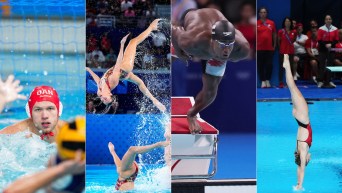Sport and Physical Activity Representatives Urge Party Leaders to Address Challenges Facing Canada
With only five days left in the current election campaign, sport and physical activity leaders today urged all federal parties to speak in greater detail about how they will place a substantive focus on sport, physical activity, and overall health prevention in order to support a healthier Canadian society which includes reduced incidences of diabetes and chronic disease and that eases the strain on an ever-burdened health care system.
With new data emerging that our kids, once again, are getting a failing grade in terms of their overall physical fitness and physical literacy, and with a health care debate almost exclusively focused on who will pay for after-the-fact remedial and acute care, sport leaders came to Ottawa to stress the benefits of an alternative approach.
Dr. Andrew Pipe of the University of Ottawa’s Heart Institute stated that “the status quo is unsustainable and we will soon have epidemic levels of childhood obesity and associated illnesses such as diabetes if nothing is done to get kids off the couch and away from screens.”
Business-as-usual in Canada’s health and wellness systems are resulting in a greater share of discretionary public expenditure being devoted to dealing with the fall-out from declining levels of fitness and chronic illness associated with sedentary lifestyles. It is proven that physical inactivity costs Canadians $1.6 billion in health care costs and $3.7 billion annually in broader social and economic costs. By increasing physical activity levels by just 10 percent, Canadians could save over $150 million annually in health care costs alone.
Andrea Grantham, Executive Director of Physical and Health Education Canada, called on Canada’s party leaders to work with their provincial counterparts in health and education ministries to formulate a properly resourced nation-wide strategy to tackle the problem. “Our children’s health is a national issue. The federal government needs to facilitate a strategy with the provinces that ensures that we have a greater focus on physical education in provincial curricula, better nutritional guidelines for schools, and an overall concerted effort to develop physical literacy for all children and youth,” said Grantham.
Jean R. Dupré, CEO and Secretary General of the Canadian Olympic Committee emphasized the importance of high performance sport in providing Canadian youth with role models and creating a sporting culture where those who are so inclined can strive for excellence. “The Vancouver Olympic and Paralympic Games demonstrated that Canada can be a great sporting nation and that this can have hugely beneficial consequences for fostering pride, national unity, and building dreams in our young athletes. We have to remember that every Canadian that stepped foot on a podium started out on a playground. We need a system that continues to give our athletes and coaches the tools to compete and succeed,” remarked Dupré.
Jeff Christie, current Olympic luge athlete and member of the Canadian Olympic Committee’s Athletes Commission, added his voice to those urging that sport be seen for its ability to promote social inclusion, build community spirit, encourage a climate of volunteerism and give at-risk groups constructive outlets for growth and social adhesion. Christie noted that “promoting sport and ongoing physical fitness creates those characteristics – self discipline, commitment, sacrifice and aspiration – that are so critical to our success as a country.”
The four main messages that the group is promoting can be found in a series of issue backgrounders at the following website: www.itsmorethanagame.ca



